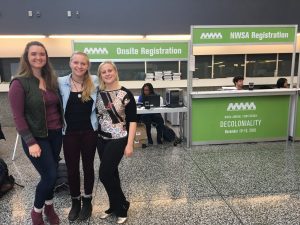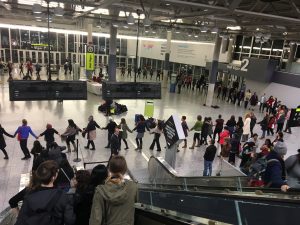Our Community Engagement grant went towards funding travel and accommodations expenses to attend the National Women’s Studies Association Conference on Decoloniality. Decoloniality, as defined by the NWSA, is a “worldview that denaturalizes settler colonial logics and structuring violences,” but part of our mission in attending the conference was to really engage with and contemplate the meaning and application of decoloniality. The conference was organized over the course of four days, with panels of experts in the field on decoloniality topics and several presentations from keynote speakers. Examples of panels that members of feminist action at Midd attended included “Indigenous Feminist and Postcolonial Feminist Understandings of Decoloniality and the Settler,” “Queer Lovers and Hateful Others: Regenerating Violent Times and Places,” “Global Fetishes and Legacies” and “Feminist Disruptions to the Neoliberal University.”

I believe that this conference was and will continue to be extremely impactful in a variety of ways. Firstly, the girls who attended the conference were tremendously influenced by the both the ideas and the power of occupying such an exemplary feminist space. I can see that exposure to such groundbreaking and high-level concepts has already beginning to influence our way of thinking just by the conversations we had returning to Middlebury. My hope is that these ideas take are further dispersed around campus through more conversations and our planned public panel with the GSFS professors.
Additionally, being surrounded by hundreds of PHD-holding women and trans folks from across the globe was a truly inspiring and validating feeling for the group – especially in light of recent political events. In such a dark period for women and trans folks, it was rejuvenating to see so many others engaged in similar work and struggle around the world.

Furthermore, we connected with many different attendees, from peers to professors, with whom we are hoping to organize and continue sustained relationships with. Through both attending the public panels and one-on-one conversations, we discovered new causes and have generated ideas for activist events we would like to stage next semester and next year. In particular, we are hoping to generate an “access map” which would capture different levels of accessibility across campus. We also are hoping to bring one of presenters to campus to talk about the prison industrial complex next semester.
All and all the conference was an incredible educational opportunity, and we are extremely grateful for our community engagement grant!